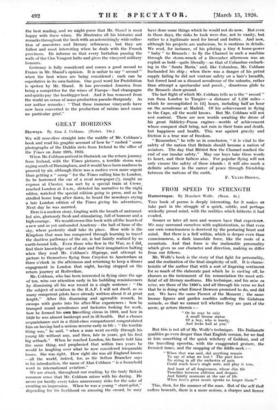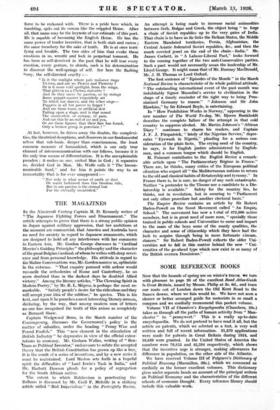FROM SPEED TO STRENGTH
Humoresque. By Humbert Wolfe. (Bean. N.) Tins book of poems is deeply interesting, for it makes us take part in the struggle of a quick, subtle, and perhaps
wickedly proud mind, with the realities which hitherto it had evaded.
Sooner or later all men and women have that experience. We may surround ourselves with sophistication, so that even our own consciousness is deceived by the posturing heart and mind. But there is a Self within, which is deeper even than consciousness, a dark immobile force, like the roots of a mountain. And that force is the inalienable personality which gives us our character and direction, making us differ from our fellows.
Mr. Wolfe's book is the story of that fight for personality, and the realization of the final simplicity of self. It is charac- teristic of the author that with a sort of lingering sentiment for so much of the elaborate past which he is casting off, he chooses as the instrument of his renunciation the most arti- ficial of all literary mediums. His technique, and his mise en scene, are those of the 1890's, and all through his verse we feel that he is doing what Ernest Dowson promised to do, and did not. We have the same Pierrot of the Moment ; the same bronze figures and garden marbles suffering the Galatean miracle, so that we cannot tell whether they are part of the scene, gr actors therein :—
" Or he may be only A small bronze statue Of a boy, who is lonely, And looks half at you."
But this is not all of M7. Wolfe's technique. His Italianate qualities go even deeper than that English version, for we find
in him something of the quick witchery of Goldoni, and of the travelling operetta, with the exaggerated gesture, the frenzied tunes, and the snapping of the fiddle-neck :-
" When that was said, did anything remain
To say of what we lost ? The poet know No string in all the orchestra of pain Could reach love's single note, and play it true.
And least of all forgiveness, whose dim fife Trembles between oblivion and despair, And faintly murmurs at the ear of life When love's great music speaks no longer there."
This, then, for the manner of the man. But of the self that suffers beneath, there is a more serious, a sharper and fiercer force to be reckoned with. There is a pride here which, in tumbling, spits out its venom like the crippled Heine. After
all, that name may be the keynote of our estimate of this poet. He is capable of becoming the English Heine. He has the same power of tender invective, that is both stab and caress ;
the same treachery for the sake of truth. He is at once terri- fying and lovable. The two sides of him that evoke these emotions in us, wrestle and lock in perpetual torment. He has been so self-deceived in the past that he will tear every emotion, every gesture, to shreds, such is his determination to discover the well-springs of self. See here the flashing irony, the self-directed cruelty :—
"Is it the sunlight whose pale radiance rings
Us two, and are we Pierrot and Pierrette ?
Or is it some cold spotlight., from the wings, That glitters on a Chelsea statuette I And do they move by passion, or by strings Some puppet-master exquisitely set
To which one dances, and the other sings—
Puppets in all but power to forget ?
And am these tears, or artificial dew Falling upon a stage, and is that sound The counterfeit, or ecstasy, of pain, And can this be an end of me and you, Or are these figures, that their fate has found, Only a broken group in porcelain ? "
At last, however, he drives away the doubts, the complexi- ties, the theatrical deceptions, and discovers in our fundamental selves that sub-basis, deeper than consciousness, the least common measure of humankind, which is our only true channel of intercommunication with our fellows, because it is the only true means of differentiation. It is the unexplainable paradox ; it makes us one, united Man in God ; it separates us, divided God in Man. Mr. Wolfe calls it " The Incom- municable Surd," and for him it points the way to an immortality that is for ever unappeased :—
" Nor only in what seems of earth or dust Or water fashioned does this freedom ride, But in our passion is the eternal lust For the eternally unsatisfied."































































 Previous page
Previous page